Escape from Boko Haram
While the Islamic extremist group continues to terrorize Nigeria, carrying out a horrific campaign of sexual violence, recent efforts by the country's armed forces have led to the rescue of hundreds of kidnapped women and girls. Marie Claire traveled there to hear their stories of survival.
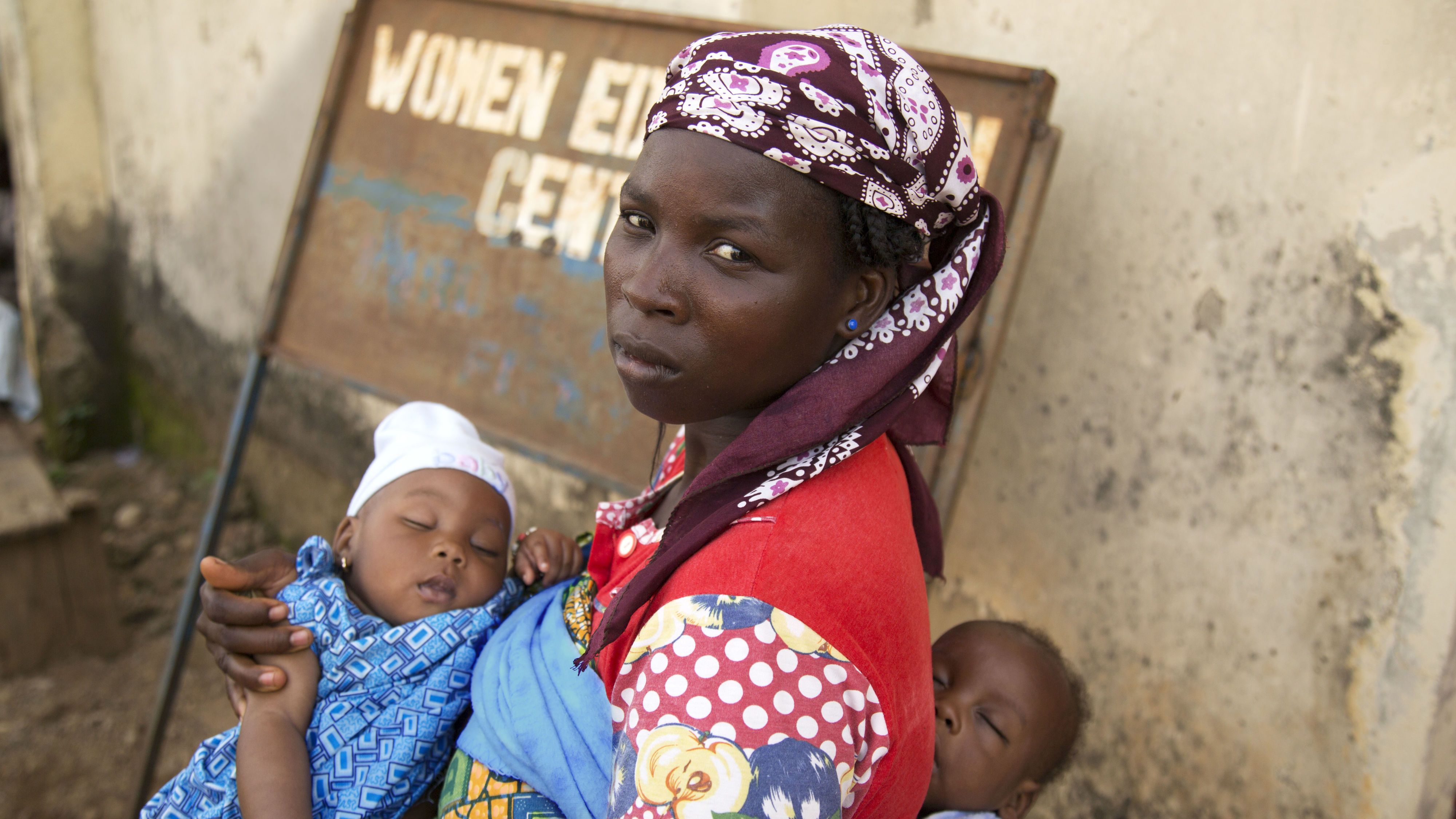
Maryam was strolling to her family's farm in the rocky hills behind the northeastern Nigerian town of Gwoza when two Boko Haram fighters blocked her path. The insurgents had overrun the area several months before, ransacking food stores and conscripting young men at gunpoint into raiding homes to extend their control across the region. Women were dragged away to remote camps, where they were subjected to forced marriage and rape; some were even brainwashed into becoming suicide bombers. The 20-year-old mother of two had so far kept clear of the militants' wrath, but on this day, the men each took turns raping her while the other held a machete blade against her neck. Maryam begged to be let go, but she knew resisting could mean death.
The gang rape was her initiation into a ruthless culture of sexual violence. After the attack, Maryam was marched to a forest camp, where she would spend the next two months with dozens of women rounded up in mass kidnappings. Though many of the fighters had forcibly taken multiple wives, she became the servant of a group of male teenagers, who were often riled up from days spent looting and killing. They taunted her with machine guns and violated her at will, anonymously, their faces cloaked in black scarves. "A man rapes you and goes away, and another one comes," she says. On the worst days, up to four men took turns with her.
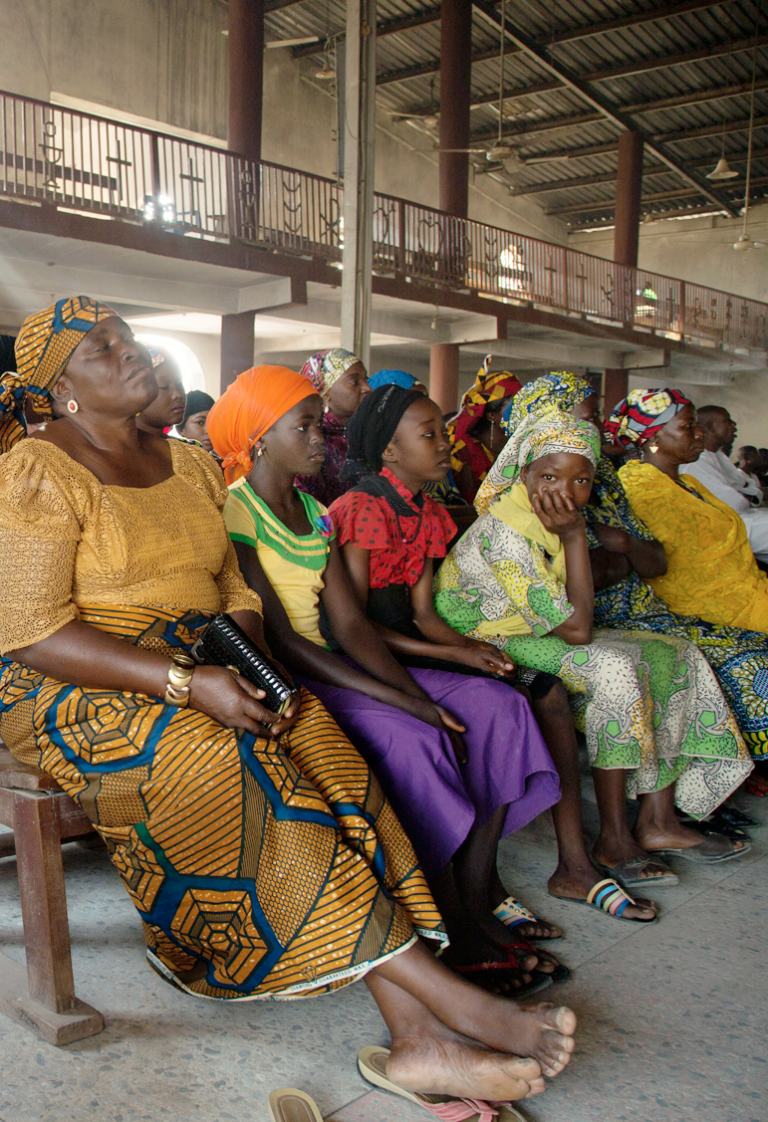
Christian women attend Sunday mass at a church in Mubi that was partially destroyed when Boko Haram insurgents overrun the city
While Boko Haram's origins and ideology are contested, everyone agrees its persecution of women has been total throughout its campaign to carve out a state ruled by strict Islamic law. The radical militant group (whose name loosely translates to "Western education is forbidden") is estimated to have abducted at least 2,000 women and girls since 2014, the year it gained global notoriety for kidnapping 276 schoolgirls from a dormitory in the village of Chibok, Nigeria, spurring the campaign #BringBackOurGirls. Today, most of these women—Christians and Muslims alike—are still held in bush camps, where they endure forced labor, combat, torture, and sexual slavery. They are the living casualties of a 6-year-old insurgency that has claimed at least 17,000 lives and displaced more than 2.6 million and counting in the poorest corner of Africa's most populous country.
Last spring, Zainab Hawa Bangura, the United Nations special representative on sexual violence in conflict, condemned Boko Haram for systematically raping female cap- tives and using them to bear children as part of a "strategy of domination and self-perpetuation." Comparing the group's tactics with those used by the Islamic State in Iraq and Syria, she added: "In order to give rise to a new generation in their own image, they are waging war on women's physical, sexual, and reproductive autonomy and rights."
The radical militant group (whose name loosely translates to "Western education is forbidden") is estimated to have abducted at least 2,000 women and girls since 2014.
These days, however, steady advances by the Nigerian military, with help from neighbors Chad, Cameroon, Niger, and Benin, have put Boko Haram on the run. An offensive in and around the Sambisa Forest, the booby-trapped, 23,000-square- mile nature reserve near the Cameroonian border that is the terrorist group's last stronghold, has liberated successive waves of hundreds of women and girls. In late November, Cameroon's defense minister announced that multinational forces had freed 900 hostages and killed 100 Boko Haram members. The previous month, the Nigerian military rescued 338 people from a pair of camps (all but eight were women or children), and in September, another 241 were freed. Dozens more have managed to escape amid the chaos of gun battles. Despite their brutal, months-long captivity, some of the women were willing to share their stories of rampant abuse and the challenges of healing deep trauma in a religiously conservative country that punishes rape victims as outcasts.
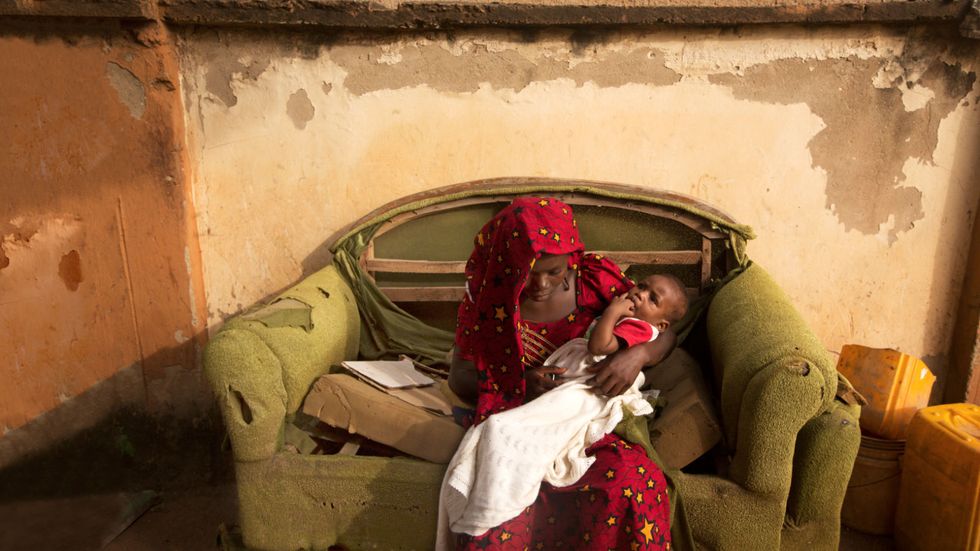
Ayesha, 20, who was raped by a Boko Haram militant, sits at a shelter in Abuja, Nigeria, with her son Simon, who was conceived as a result.
One of the freed women, Falmata, 25, says Nigerian security forces were nowhere to be found when Boko Haram attacked her village near Maiduguri, the group's birthplace and the capital of Borno State in northeastern Nigeria, back in July 2014. In the middle of the night, equipped with flash- lights and AK-47s, they went door-to-door among the adobe dwellings, firing into the air and executing any males they found, including her 20-something next-door neighbor, who was slaughtered in front of his mother. Along with some 40 women, Falmata and her then 4-year-old daughter were taken to a camp on the fringe of Sambisa Forest. No food, clothing, or shelter was provided—the women had to make do on what they could scrounge, and the constant hunger and fatigue made it hard for Falmata even to speak. She says she was forced to have sex with three men on a rotating basis for the better part of a year. "If I refused, they would do it forcefully— this is how I became pregnant [with a second child]," Falmata says. "They are barbaric, the worst people I have ever seen."
The wives of Boko Haram fighters showed no sympathy. Though they themselves had been abducted and forced into marriage, prolonged captivity had induced a kind of Stockholm syndrome, in which they sided with the militants and espoused their harsh ideology. "Whenever we'd ask them for help, they would tell us that we had enjoyed our [more privileged] lives in the towns, and it was their turn to be on top," Falmata says. The Boko Haram wives forced them to wear long robes to cover all of their skin, and the more "wicked" ones would tattle on the prisoners to their husbands if they dared ask for favors. Beatings would follow.
Get exclusive access to fashion and beauty trends, hot-off-the-press celebrity news, and more.
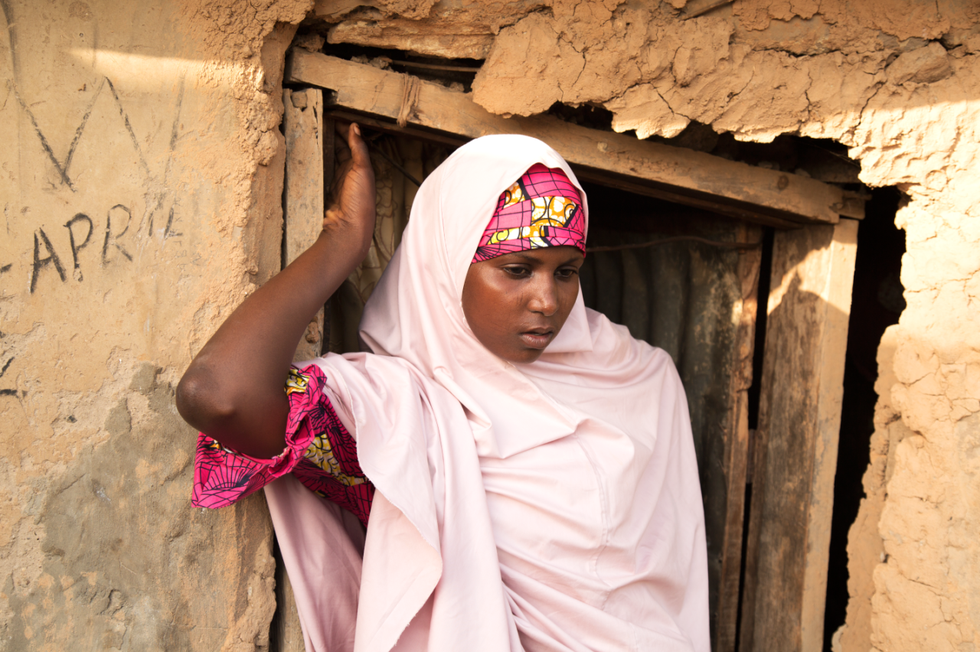
Ayesha Musa's husband had his throat slit by Boko Haram fighters; she now supports her children by selling milk in the street
Only older women are spared from sexual abuse. Taniya Ali, 58, a Christian widow from Gwoza, an epicenter of the conflict, says younger women were issued an ultimatum in the camp where she was held for 10 months: Convert and marry, or die. Weddings were performed by a Boko Haram cleric in a white robe and beard. If a girl cried during sex, her new husband threatened to slit her throat. Ali's submitting to convert to Islam and pray five times a day did not shield her from pain. She was forced to recite Koranic verse daily; if she failed to do so correctly after three attempts, she was struck repeatedly on her ears. If the mistakes continued, she was made to lie down as fighters took turns walking over her.
Finally, she could take no more. One night last summer, Ali snuck into the bush with another woman. Many days— she can't remember how many—were spent crawling on the ground, scavenging for edible plants, until they reached a town. She now lives in a drab shelter in Abuja, Nigeria's capital, with about 100 other displaced women. Eight women share each room, and they depend on handouts of rice from area residents. A local businessman has bought sewing machines to train the women as seamstresses, but Ali is too frail to work. Already missing one eye from an earlier accident, she was left almost deaf by the constant beatings—all she has are her tortured memories. "I am so sad," she says. "I wish Boko Haram had killed me."
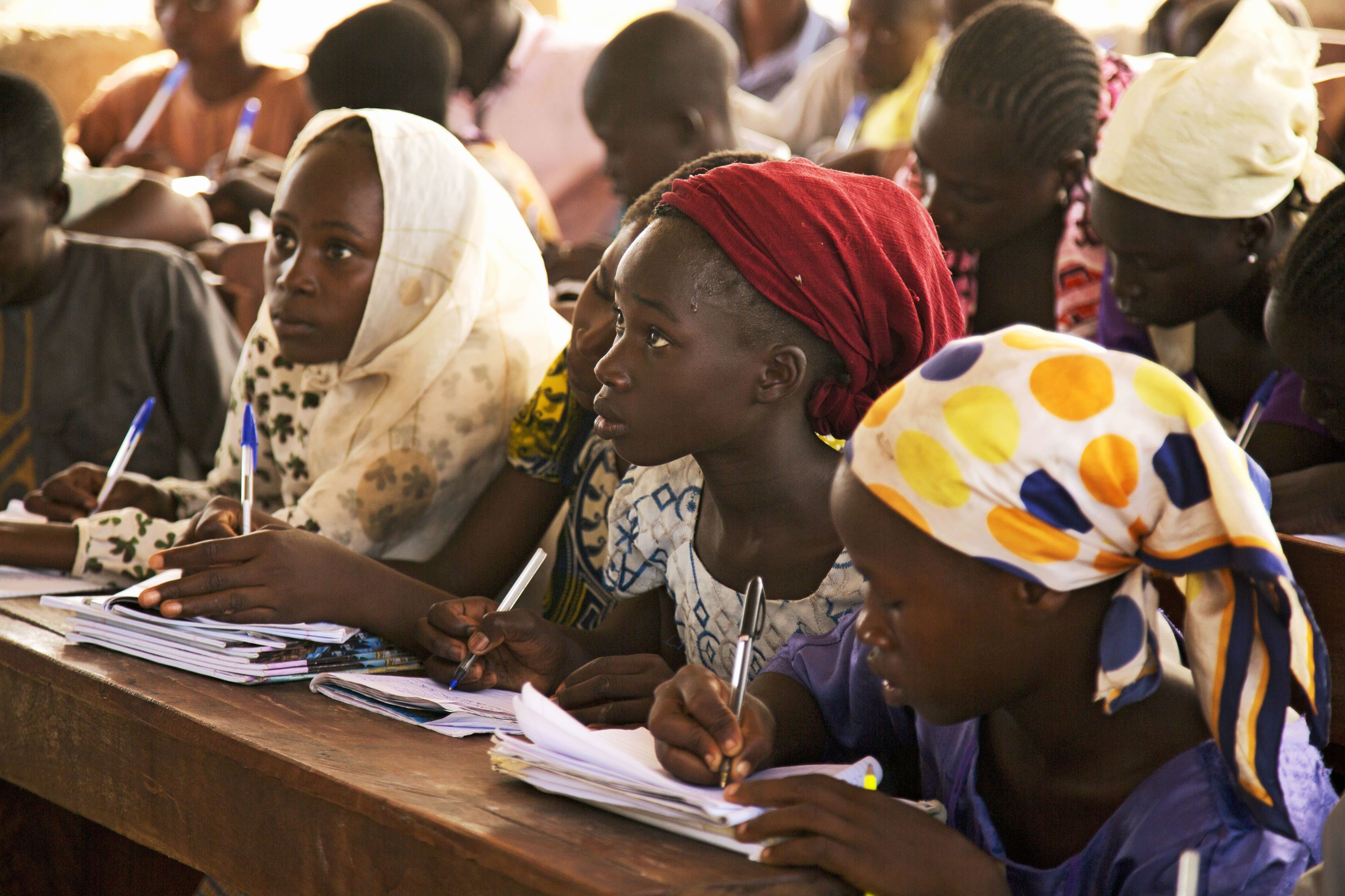
Young girls uprooted by the Boko Haram insurgency study at a temporary school in Yola, where they are taught by volunteer teachers who were also displaced
Another woman at the shelter, Ayesha, 20, evaded numerous Boko Haram raids until she was caught by a machete- wielding fighter, who raped her for an hour as her screams went unheard. After he left her, she returned home to find it burned and her relatives gone, so she began a year's journey through camps for internally displaced people (or IDP camps). Along the way, she gave birth to the son, Simon, conceived in the rape. Despite his origins, she calls the boy "a gift from God." He was born on May 29, 2015, the day Nigeria's current president, Muhammadu Buhari, was sworn into office.
Nigeria's last president, Goodluck Jonathan, drew criticism for not doing enough to free Boko Haram hostages and end the insurgency. Buhari, a former military ruler, vowed to wipe out Boko Haram by the end of 2015. His no-nonsense reputation swept him to victory early in the year. Though militants still carry out hit-and-run attacks in the countryside and bombings in urban centers, he continues to deliver on the thrust of his pledge. Some of the group's leaders have been arrested, and Nigerian forces have rebounded from a string of losses to reclaim swaths of insurgent-held territory, allowing them to narrow their focus on Sambisa Forest.
While nearly every month brings fresh reports of hostages being liberated, authorities give no indication of whether any were among the hundreds of girls kidnapped at Chibok. After they are rescued, the government screens the girls and provides medical treatment at undisclosed locations, nominally to safeguard them from possible Boko Haram reprisals. For the hundreds of thousands of women displaced by Boko Haram's terror, mortal dangers persist even in places where they have seemingly found safe haven. Last September 11, for instance, a bomb exploded inside one of the country's largest IDP camps in the heavily guarded Adamawa state capital, Yola, killing seven women and children.
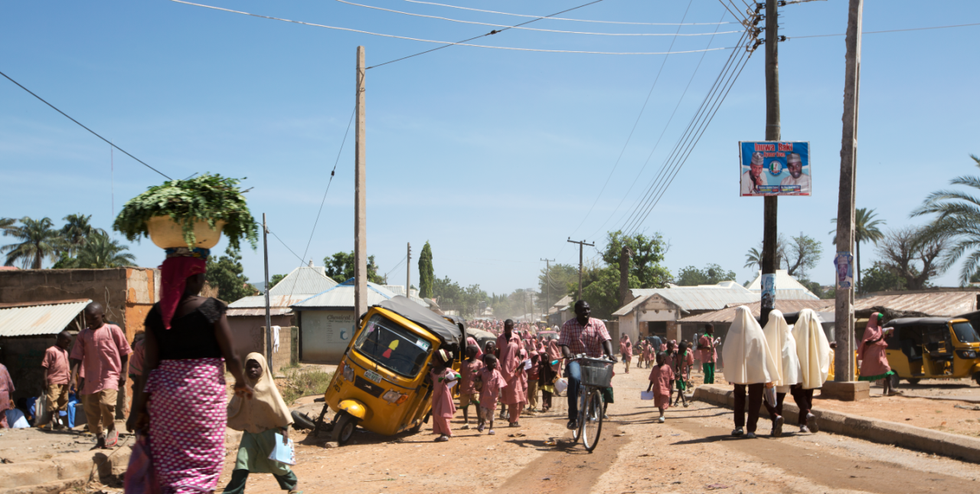
The streets of Mubi are busy again a year after Boko Haram was ousted. The militants had declared the city the capital of their short-lived state in northeastern Nigeria
Meanwhile, those lucky enough to escape from captivity must cope with stigmatization. Maryam, the woman who was gang-raped prior to her kidnapping, ultimately trekked out of Sambisa when the Nigerian military attacked her camp. She carried her son on her back, first to her village, then to Cameroon and back, moving between several towns before settling in Maiduguri. These days, she can't even show her face publicly. "They mock me and tell me I'm the whore of Boko Haram," she says. "But what can I do? They are right, after all." She vacillates between numbness and rage, especially toward her husband, who suspects she was raped but does not know the extent. Nightmares plague her sleep, and having sex is impossible. "I don't know if there's anything that can be done that would give me peace right now," she says. "If I could have help to forget my past, I would take it."
Falmata, the impregnated Boko Haram captive, ran from her forest camp while her tormentors said their morning prayers, eventually making her way to Maiduguri. She, too, says she has been cast out by the community. Though some nongovernmental organizations offer social services to freed hostages, resources are scarce. Doctors prescribed anti-depressants she can't afford. Her husband disappeared in her absence, and she wakes up to a child whose face is a reflection of her darkest moments. "Before delivering the child, I felt like taking poison and dying with the child in my stomach," Falmata says. "Up to now, the child is not in my heart."
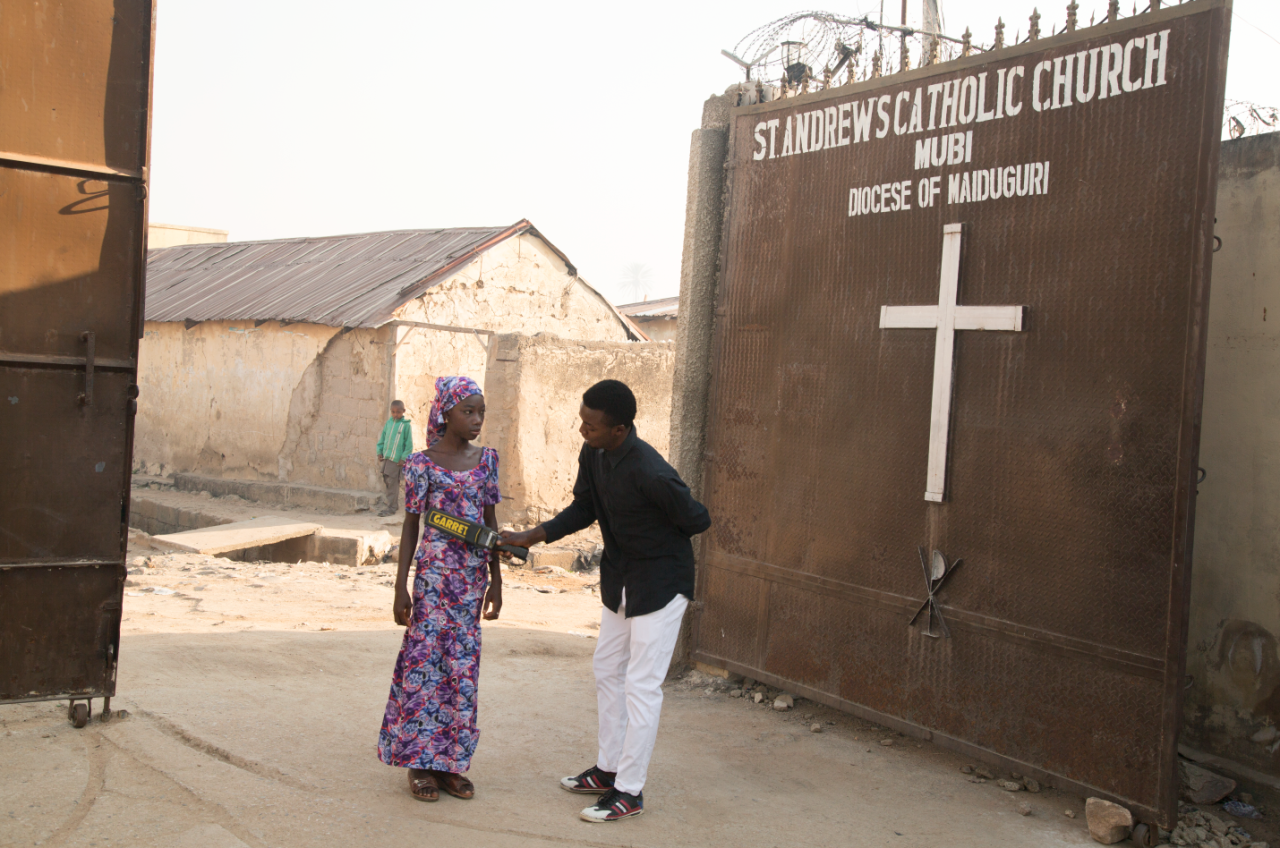
A guard checks a young girl for explosives at a Catholic church in Mubi. Boko Haram has used some girls as suicide bombers
She did eventually marry a man who belongs to a civilian paramilitary group and patrols the city's mean streets without receiving a paycheck. The couple lives in a barren, one-room apartment and is "managing" life, Falmata says. Military and police checkpoints abound, with good reason: Last November, local authorities foiled a Boko Haram plot involving multiple attackers armed with homemade explosives. A couple days later, in the northern city of Kano, two female suicide bombers—one of them said to be as young as 11—blew themselves up in a busy market, killing 15 people. Frequent suicide attacks and market bombings— a signature of Boko Haram's evolving terror strategy in the region—continue to kill innocents and keep Falmata on edge. "I shake whenever I hear a loud noise," she says. "I am still fearful [Boko Haram] will come back again."
I shake whenever I hear a loud noise. I am still fearful Boko Haram will come back again.
For all the gloom and heartache, there are also stories of resilience. In late 2014, 57 of the Chibok girls escaped to safety. Today, 23 of them attend the American University of Nigeria (AUN) in Yola. The sprawling private college is home to some 1,500 students, an oasis of education on the fringe of an insurgency that rejects it. Over the year, their teachers say the girls have gone from timid and withdrawn to engaged, English-speaking students who do their coursework on donated laptops.
A mix of normalcy and mental-health counseling has been essential to the healing process, says Regina Mousa, the school psychologist. She has met with the Chibok girls regularly since their arrival for talk therapy sessions to help them confront their traumatic experiences, which range from their abduction at gunpoint to one student's seeing her father's throat slashed. With time, Mousa says, it's possible to loosen the grip abuse has on the mind and body. But "it's a fragile process" that can be easily upset by the insecurity that prevails outside school walls. She notes that there are only a handful of psychologists working in the state and worries that without sufficient treatment, legions of traumatized women are at risk for debilitating psychoses.
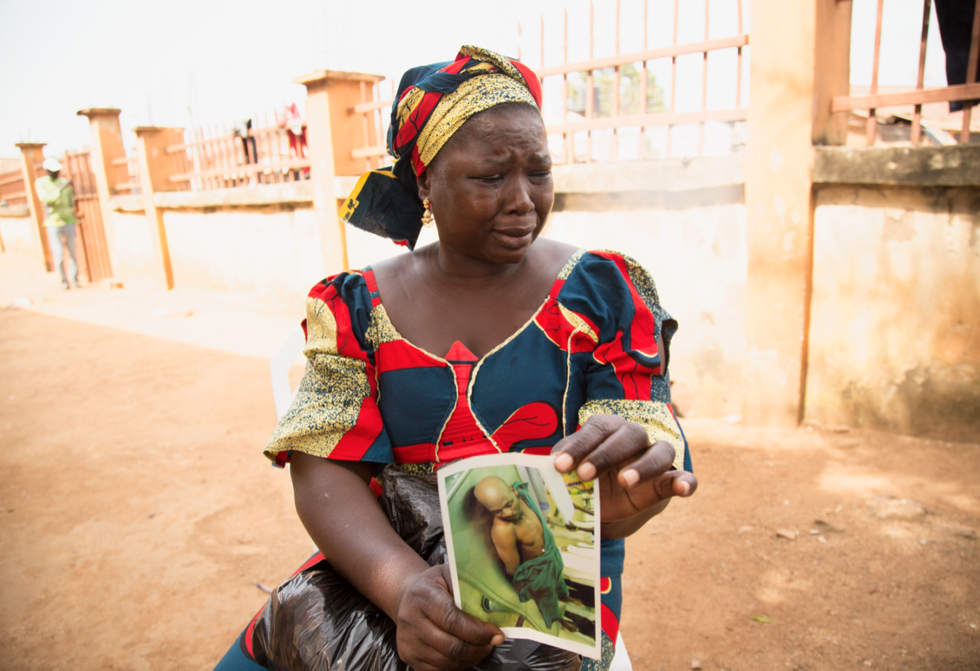
After Boko Haram fighters killed her husband, Lami Joseph had to move to a shelter outside Abuja with her five children
On a weekday afternoon at AUN's state-of-the-art library, it's impossible to tell the Chibok girls apart from the rest of the students. In between classes that will prepare them to take the university entrance exam and formally pursue degrees, they thumb their donated smartphones while dressed in a vibrant mix of traditional and Western casual clothes. "When I first came, I was scared—I'd never been to a place like this," says 17-year-old Blessing, smiling a wide grin. "Now I'm not scared of anything." She and her two friends from Chibok are determined to head back to their now infamous village and take part in its growth—as a doctor, an accountant, and a lawyer, respectively. "This group has experienced trauma no one can imagine," says Margee Ensign, the university president. "And they are now looking forward, as young people should."
With additional reporting by Blessing Tunoh and Sani Adam; this story was reported in part with a grant from the Pulitzer Center on Crisis Reporting. To donate to AUN, visit aunf.org.
This article appears in the February issue of Marie Claire, on newsstands now.